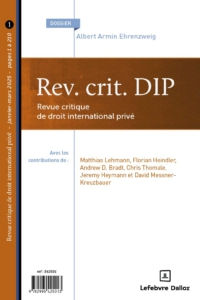Views
Egyptian Supreme Court on the Enforcement of Foreign Judgments – Special Focus on the Service Requirement
I . Introduction
Egypt and its legal system occupy a unique position within the MENA region. Egyptian law and scholarship exert a significant influence on many countries in the region. Scholars, lawyers, and judges from Egypt are actively involved in teaching and practicing law in many countries in the region, particularly in the Gulf States. Consequently, it is no exaggeration to say that developments in Egyptian law are likely to have a profound impact on neighboring countries and beyond, and warrant special attention. Read more
International Jurisdiction between Nationality and Domicile in Tunisian Private International Law – Has the Perennial Debate Finally been Resolved?
I would like to thank Prof. Lotfi Chedly for providing me with the text of the decision on which this post is based.
I. Introduction
Scholars of private international law are well familiar with the classic debate on nationality and domicile as connecting factors in the choice of applicable law (see, for example, L. I. de Winter, “Nationality or Domicile? The Present State of Affairs” 128 Collected Courses III (1969) pp. 357 ff). In Tunisian private international law, this controversy has been particularly pronounced with regard to the role of nationality as a ground for the international jurisdiction of Tunisian courts. Since the enactment of the Tunisian Private International Law Code (“PILC”) in 1998 (for an English translation, see J. Basedow et al. (eds.) Encyclopedia of Private International Law – Vol. IV (Elgar Editions, 2017) 3895 and my own translation of the provisions dealing with international jurisdiction and the enforcement of foreign judgments in 8 Journal of Private International Law 2 (2012) pp. 221 ff)), the debate between opponents and proponents of nationality as a ground for international jurisdiction, especially in family law matters, has never ceased to be intense (for detailed analyses, see eg. Salma Triki, “La compétence internationale tunisienne et le critère de nationalité” in Ben Achour/Triki (eds.), Le Code de droit international privé – Vingt ans d’application (1998-2018) (Latrach edition, 2020) 119ff). This divergence in academic opinion is also reflected in the judicial practice of the courts, with the emergence of two opposing trends: one extends the international jurisdiction of the Tunisian courts when the dispute involves a Tunisian party, in particular as a defendant even when domiciled abroad. The other firmly rejects nationality as a ground for international jurisdiction.
An Answer to the Billion-Dollar Choice-of-Law Question
On February 20, 2024, the New York Court of Appeals handed down its opinion in Petróleos de Venezuela S.A. v. MUFG Union Bank, N.A. The issue presented—which I described in a previous post as the billion-dollar choice-of-law question—was whether a court sitting in New York should apply the law of New York or the law of Venezuela to determine the validity of certain bonds issued by a state-owned oil company in Venezuela. The bondholders, represented by MUFG Union Bank, argued for New York law. The oil company, Petróleos de Venezuela, S.A. (“PDVSA”), argued for Venezuelan law.
In a victory for PDVSA, the New York Court of Appeals unanimously held that the validity of the bonds was governed by the law of Venezuela. It then sent the case back to the federal courts to determine whether the bonds are, in fact, invalid under Venezuelan law.
Read more
News
Revue Critique de droit international privé – issue 2025/1
 Written by Hadrien Pauchard (assistant researcher and doctoral student at Sciences Po Law School)
Written by Hadrien Pauchard (assistant researcher and doctoral student at Sciences Po Law School)
The first issue of the Revue Critique de droit international privé of 2025 has just been released. It gathers six contributions honouring Albert Armin Ehrenzweig and his legacy, as well as seven case notes and numerous book reviews.
The doctrinal part of the volume is devoted to the proceedings of the Albert Armin Ehrenzweig Conference organized in June 2024 at the University of Vienna, fifty years after the passing away of the great author. The contributions commemorate both the man and the scientist, testifying to the relevance of Albert A. Ehrenzweig’s scholarship to contemporary private international law. They are published in French in the printed version of the Revue (also available online here), and will be available shortly in English (here).
Out Now: Dickinson, Natural Justice in Recognition and Enforcement of Foreign Judgments, Recueil des cours, Tome 446
Last summer, Andrew Dickinson (Professor of the Conflict of Laws, University of Oxford, and former editor of ConflictofLaws.net) delivered a special course at the summer course of the Hague Academy of International Law entitled ‘Natural Justice in Recognition and Enforcement of Foreign Judgments’. It has now been published as Volume 446 of the Recueil des cours / Collected Courses.
The blurb reads as follows:
This special course assesses the utility of ideas of ‘natural law’ and ‘natural justice’ as tools to explain, rationalise and develop the rules governing the recognition and enforcement of foreign judgments currently applied by the world’s legal orders.
After introducing the topic, the first part of the course consider how influential 17th and 18th century accounts of the law of nature sought to account for the relations existing between all human beings, as well as the creation of political societies with law-making powers, the global ordering of those societies and the role of adjudication as a means of resolving disputes within and among them. This provides the historical and intellectual background for what follows.
The principal part of the course considers how writers on the conflict of laws in this period drew upon and utilised these ideas, as the rules that we apply today to regulate foreign judgments began to take shape. This leads to a study of the further evolution of the legal landscape in the 19th century, highlighting the use of natural law reasoning by judges and commentators to explain and justify the effectiveness of individual exercises of adjudicatory authority beyond their original domains, as well as the later rejection of natural law thinking in favour of models centred on ideas of sovereignty and territoriality, which continue to dominate today.
Having completed this historical survey, the course examines the specific legacy of natural law reasoning in the common law world, involving the use of principles of ‘natural justice’ to deny recognition of unjust foreign judgments, as well as the counterparts of these principles in other legal systems and international treaties.
Drawing on the preceding material, the concluding chapter considers the case for renaturalising the law in this area, and the implications of following this path.
More information on the book can be found here.
It is available to subscribers to the Recueil des cours here.
AMEDIP: Annual seminar to take place from 22 to 24 October 2025 (in Spanish)

The Mexican Academy of Private International and Comparative Law (AMEDIP) will be holding its XLVIII Seminar entitled “Reflections regarding the Inter-American system in the 50th Anniversary of the CIDIP-I and the latest developments of Private International Law in Mexico” (Reflexiones en torno al sistema interamericano en el 50 Aniversario de la CIDIP-I y la actualidad del Derecho Internacional Privado en México) from 22 to 24 October 2025. The venue of the seminar will be the Universidad Autónoma de Querétaro (Querétaro, Mexico). Read more


